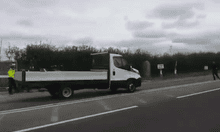The traffic generated by fracking in the UK would increase air pollution substantially at a local level at the busiest times, according to a study about the potential impact of lorry traffic.
The research found that the number of tankers taking water to and from drilling sites would increase hourly levels of nitrogen oxide emissions (NOx) by as much as 30%.
The study by a Newcastle University team, published in the journal Environment International on Wednesday, also said fracking traffic would increase noise levels locally and could damage rural roads.
The traffic caused by heavy vehicles transporting water for the controversial technique – which requires thousands of cubic metres of water to be pumped underground to fracture shale rock and release gas – has already been an obstacle for the industry in the UK.
Last year, leading shale gas explorer Cuadrilla had to redraw plans for a fracking application to minimise traffic after concerns were raised by Lancashire county council, whose planning officers also recommended against one site because of the severe impact on road safety.
The authors of the study said that while the increased air pollution was unlikely to be a serious issue in rural areas, such as the sites Cuadrilla is looking at outside Blackpool, it could be more problematic if fracking happens nearer urban areas.
They created a traffic model for a hypothetical six well site over an 85-week period. They found NOx emissions increased 6% over the course of the period, or between 18-30% for hourly NOx readings at the most intense periods of activity.
“The traffic impact of a single well pad can create substantial increases in local air quality pollutants during key activity periods,” the study said.
Dr Paul Goodman, researcher in transport and the environment at Newcastle, said there was also another potential issue since an individual well might require hundreds of tanker truck journeys, crammed into a short period of time.
“Tankers are a very visible element of an industry and we as a country haven’t much experience of heavy industry on our roads, there’s potentially an image problem,” he said.
He added that the use of large water tankers, some as large as the 40-tonne type that transport petrol and diesel to fuelling stations, could damage some roads. “If we don’t have a potholes budget, it may become problematic as to who pays for the repair of the roads,” Goodman said.
Ironically, the study found that the later a fracking industry took off in the UK, the cleaner it would be in terms of air pollution, because of new European standards for heavy vehicles being introduced. It also noted that there was a trade-off between noise and air pollution – while running tankers at night would reduce pollution owing to less congestion, the noise would have a greater impact on local people.
The authors said that while there could be local pollution issues, at a national level the additional pollution was negligible.
Ken Cronin, chief executive of Ukoog, the trade body that represents shale gas companies, said: “This report into the traffic-related environmental impacts of hydraulic fracturing operations released by ReFINE, uses US data, and doesn’t take account of the UK’s strict regulatory and planning regimes which require logistics planning and integrated traffic management to be a part of every planning application. Permitting and planning systems restrict truck movements at night and at certain times of the day.
“Additionally the report’s conclusions fail to take into account, that in the UK, water is more often available through pipelines, so there is no need to transport it across the country by truck.”
On Monday, the association for water and environment professionals, CIWEM, found in a report that dealing with the water that flows back to the surface during fracking was the most significant risk from the technology.









